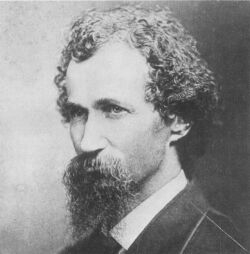Analysis of Peter the Piccaninny
Henry Kendall 1839 (Australia) – 1882 (Sydney)
He has a name which can’t be brought
Within the sphere of metre;
But, as he’s Peter by report,
I’ll trot him out as Peter.
I call him mine; but don’t suppose
That I’m his dad, O reader!
My wife has got a Norman nose—
She reads the tales of Ouida.
I never loved a nigger belle—
My tastes are too aesthetic!
The perfume from a gin is—well,
A rather strong emetic.
But, seeing that my theme is Pete,
This verse will be the neater
If I keep on the proper beat,
And stick throughout to Peter.
We picked him up the Lord knows where!
At noon we came across him
Asleep beside a hunk of bear—
His paunch was bulged with ’possum.
(Last stanza will not bear, I own,
A pressure analytic;
But bard whose weight is fourteen stone,
Is apt to thump the critic.)
We asked the kid to give his name:
He didn’t seem too willing—
The darkey played the darkey’s game—
We tipped him with a shilling!
We tipped him with a shining bob—
No Tommy Dodd, believe us.
We didn’t “tumble” to his job—
Ah, why did Pete deceive us!
I, being, as I’ve said, a bard,
Resolved at once to foster
This mite whose length was just a yard—
This portable impostor!
“This babe”—I spoke in Wordsworth’s tone—
(See Wordsworth’s “Lucy”, neighbour)
“I’ll make a darling of my own;
And he’ll repay my labour.
“He’ll grow as gentle as a fawn—
As quiet as the blossoms
That beautify a land of lawn—
He’ll eat no more opossums.
“The child I to myself will take
In a paternal manner;
And ah! he will not swallow snake
In future, or ‘goanna’.
“Will you reside with me, my dear?”
I asked in accents mellow—
The nigger grinned from ear to ear,
And said, “All right, old fellow!”
And so my Pete was taken home—
My pretty piccaninny!
And, not to speak of soap or comb,
His cleansing cost a guinea.
“But hang expenses!” I exclaimed,
“I’ll give him education:
A ‘nig’ is better when he’s tamed,
Perhaps, than a Caucasian.
“Ethnologists are in the wrong
About our sable brothers;
And I intend to stop the song
Of Pickering and others.”
Alas, I didn’t do it though!
Old Pickering’s conclusions
Were to the point, as issues show,
And mine were mere delusions.
My inky pet was clothed and fed
For months exceeding forty;
But to the end, it must be said,
His ways were very naughty.
When told about the Land of Morn
Above this world of Mammon,
He’d shout, with an emphatic scorn,
“Ah, gammon, gammon, gammon!”
He never lingered, like the bard,
To sniff at rose expanding.
“Me like,” he said, “em cattle-yard—
Fine smell—de smell of branding!”
The soul of man, I tried to show,
Went up beyond our vision.
“You ebber see dat fellow go?”
He asked in sheer derision.
In short, it soon occurred to me
This kid of six or seven,
Who wouldn’t learn his A B C,
Was hardly ripe for heaven.
He never lost his appetite—
He bigger grew, and bigger;
And proved, with every inch of height,
A nigger is a nigger.
And, looking from this moment back,
I have a strong persuasion
That, after all, a finished black
Is not the “clean”—Caucasian.
Dear Peter from my threshold went,
One morning in the body:
He “dropped” me, to oblige a gent—
A gent with spear and waddy!
He shelved me for a boomerang—
We never had a quarrel;
And, if a moral here doth hang,
Why let it hang—the moral!
My mournful tale its course has run—
My Pete, when last I spied him,
Was eating ’possum underdone:
He had his gin beside him.
| Scheme | ABXBCBCA DEDE FBFB GHGX IEIE JKJK LMLM NBNB IBIX OXOC PBPI XQXQ RIRS TUTU VWVW QXQX YSYS ZIZU NKNK QUQU SUSU 1 B1 B 2 U2 U 3 S3 S 4 5 4 5 UHIH |
|---|---|
| Poetic Form | |
| Metre | 11011111 0101110 11110101 1111110 11111101 1111110 11110101 110111 11010101 1111010 00110111 0101010 11011111 1111010 11110101 0101110 11110111 1111011 01010111 1111110 11011111 010010 11111111 1111010 11011111 111110 011011 1111010 11110101 1101011 1110111 1111011 11011101 0111110 11111101 1100010 1111011 11101 11010111 010111 11110101 1101010 1100111 11111 0111111 0001010 01111101 01011 11011111 1101010 01011111 0111110 01111101 1101 01111111 1101010 11010101 111010 01110111 0110010 11001 01101010 01011101 1100010 0111111 11010 01011101 0101010 11011101 1101010 11011111 1101010 11010111 011111 11110101 1101010 11010101 1111010 11111101 1111110 01111111 11011010 1111101 1101010 01110111 1111110 1111011 1101110 1101110 1101010 011100111 0101010 01011101 1101010 11010101 1101010 1101111 1100010 11110101 0111010 1111010 1101010 01010111 1111010 11011111 1111111 110101 1111011 |
| Closest metre | Iambic tetrameter |
| Characters | 3,408 |
| Words | 636 |
| Sentences | 40 |
| Stanzas | 26 |
| Stanza Lengths | 8, 4, 4, 4, 4, 4, 4, 4, 4, 4, 4, 4, 4, 4, 4, 4, 4, 4, 4, 4, 4, 4, 4, 4, 4, 4 |
| Lines Amount | 108 |
| Letters per line (avg) | 23 |
| Words per line (avg) | 6 |
| Letters per stanza (avg) | 96 |
| Words per stanza (avg) | 24 |
Font size:
Submitted on May 13, 2011
Modified on March 14, 2023
- 3:10 min read
- 41 Views
Citation
Use the citation below to add this poem analysis to your bibliography:
Style:MLAChicagoAPA
"Peter the Piccaninny" Poetry.com. STANDS4 LLC, 2024. Web. 28 Apr. 2024. <https://www.poetry.com/poem-analysis/17552/peter-the-piccaninny>.


Discuss this Henry Kendall poem analysis with the community:
Report Comment
We're doing our best to make sure our content is useful, accurate and safe.
If by any chance you spot an inappropriate comment while navigating through our website please use this form to let us know, and we'll take care of it shortly.
Attachment
You need to be logged in to favorite.
Log In